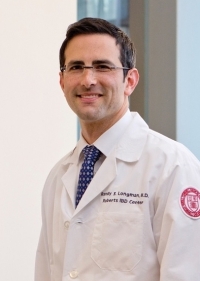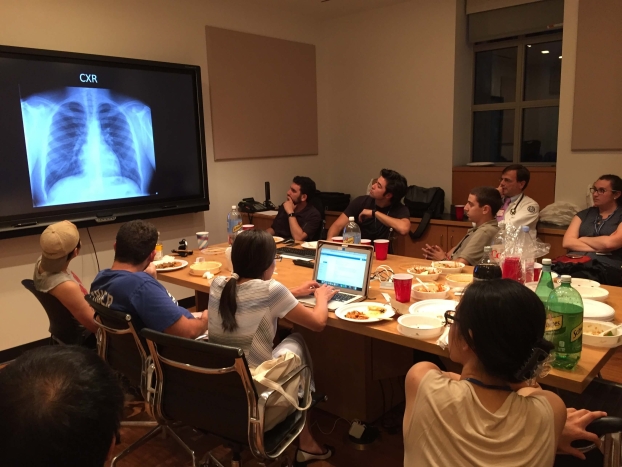In addition to medical and graduate school courses, MD-PhD students participate in several MD-PhD-specific courses and seminars.
Careers in Biomedicine Summer Series
During July and August, the 1st and 2nd year students are introduced to physician-scientist role models in this series of weekly lunch discussions. Invited speakers include clinical investigators and other faculty who are in unique positions to provide a longitudinal view of biomedical research and the career decisions that led to their current positions and responsibilities. One of the most important elements that emerges during these discussions is how and why specific decisions were made at different points of a career – and how one's career can be shaped by seizing unexpected opportunities and making the most of serendipity.
Frontiers in Biomedical Science I and II

Courses for 1st and 2nd year students are coordinated by Assocociate Program Director Randy Longman, MD, PhD.
Frontiers in Biomedical Science is an advanced-level journal club in which Tri-Institutional faculty tutors select one or two original research articles for discussion. The faculty tutor gives students a general overview of the topic and then leads a 60 minute critical discussion of the research article(s).
The following topics are covered in the Frontiers I: Cell Metabolism & Metabolic Disease; Hematology & Cancer; Infectious Diseases, Emerging Pathogens, & Vaccines; and Autoimmunity, Inflamation, & Fibrosis
Frontiers II covers the following topics: Neuroscience & Neurological Disease and Translational Therapies & Computational Medicine.
While this course is designed for MD-PhD students, it is open to 1st year medical students who are considering applying for transfer to the MD-PhD Program.
Introduction to Clinical and Translational Research
Offered in the fall semester of the 1st year, this course covers concepts related to translational biomedical research and clinical trials, using investigative new drugs, new drug approval process, federal regulations, as well as intellectual property issues. Faculty members from each institution describe their own work with special consideration of the unique aspects of drug development and international and pediatric clinical trials.
Research Lunches
In the spring of their first year, MD-PhD students attend the weekly series Researches Lunch speaker series. As a more loosely structured companion to the Frontiers in Biomedical Science sequence, the Research Lunches offer students the opportunity to get to know faculty and learn about their research in a more relaxed setting.
Case Discussion Rounds
Dr. Mark Pecker, Clinical Associate Director, runs a series of biweekly clinical case-based seminars with the goal of providing students in their research years the opportunity to further develop their skills in clinical reasoning and thus help them maintain familiarity with clinical medicine.
Case Discussion Rounds (CDR) are modeled after a program initially developed by a former Memorial Sloan Kettering faculty member, Dr. Bernd Gänsbacher, now emeritus at Technische Universität München (Technical University of Munich).

In each CDR session, a student presents a clinical case to a group of their peers incuding: chief complaint, history of present illness, social history, and findings on physical exam. The group discusses key findings in their attempts to decipher the etiology of the patient's signs and symptoms.
The group is then charged with asking the student presenter for laboratory tests and providing an explanation for why they are ordering a specific test. The results of the tests are presented and a differential diagnosis is generated. A final diagnosis is proposed after any additional information has been provided. The student presenter then provides some teaching points about the case, and is asked to delineate key questions that remain unresolved regarding the disease at hand, and the implications these questions have for the treatment of patients and for future clinical investigation. This follow-up discussion usually touches on topics at the frontier of biomedical science, befitting the group's focus on becoming future physician-scientists.
The seminar's focus on pathophysiology, and Dr. Pecker's unrelenting emphasis on mechanisms, are key to the success of the CDR. Creative thinking is encouraged and expected!